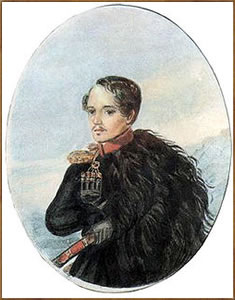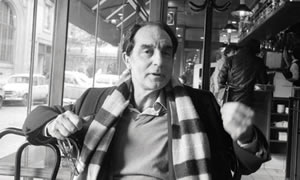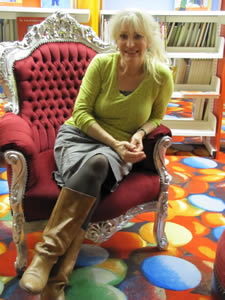De Russische dichter en schrijver Michail Joerjevitsj Lermontov werd geboren op 15 oktober 1814 in Moskou. Zie ook mijn blog van 15 oktober 2010 en eveneens alle tags voor Michail Lermontov op dit blog.
The Cross On the Rock
I know a rock in a highland’s ravine,
On which only eagles might ever be seen,
But a black wooden cross o’er a precipice reigns,
It rots and it ages from tempests and rains.
And many years have gone without any hints,
From times when it was seen from faraway hills.
And its every arm is raised up to the sky,
As if catching clouds or going to fly.
Oh, if I were able to rise there and stay,
Then how I’d cry there and how I’d pray;
And then I would throw off real life’s chains
And live as a brother of tempests and rains!
Requiem
1831
There is a blest place: by the trace
In wilderness, in a little glade’s middle,
Where in the eve, mists twine and bristle
In moony silver’s easy lace…
My friend! You know that glade, fair;
There dig a pit and let me rest,
When I will cease to breathe in air.
Give to that grave a good regard —
Let all be legally there settled
Raise on the grave a cross of maple,
And place a stone, wild and hard.
When thunderstorms will shake the forest,
The traveler will see my cross;
Maybe, the stone and the moss
Will give to him a rest at most.
Vertaald door Yevgeny Bomver

Michail Lermontov (15 oktober 1814 – 27 juli 1841)
Zelfportret, 1837
De Italiaanse schrijver Italo Calvino werd geboren in Santiago de las Vegas op Cuba op 15 oktober 1923. Zie ook mijn blog van 15 oktober 2010 en eveneens alle tags voor Italo Calvino op dit blog.
Uit: Invisible Cities (Vertaald door William Weaver)
“The city of Leonia refashions itself every day: every morning the people wake between fresh sheets, wash with just-unwrapped cakes of soap, wear brand-new clothing, take from the latest model refrigerator still unopened tins, listening to the last-minute jingles from the most up-to-date radio.
On the sidewalks, encased in spotless plastic bags, the remains of yesterday’s Leonia await the garbage truck. Not only squeezed rubes of toothpaste, blown-out light bulbes, newspapers, containers, wrappings, but also boilers, encyclopedias, pianos, porcelain dinner services. It is not so much by the things that each day are manufactured, sold, bought that you can measure Leonia’s opulence, but rather by the things that each day are thrown out to make room for the new. So you begin to wonder if Leonia’s true passion is really, as they say, the enjoyment of new and different things, and not, instead, the joy of expelling, discarding, cleansing itself of a recurrent impurity. The fact is that street cleaners are welcomed like angels, and their task of removing the residue of yesterday’s existence is surrounded by a respectful silence, like a ritual that inspires devotion, perhaps only because once things have been cast off nobody wants to have to think about them further.
Nobody wonders where, each day, they carry their load of refuse. Outside the city, surely; but each year the city expands, and the street cleaners have to fall farther back. The bulk of the outflow increases and the piles rise higher, become stratified, extend over a wider perimeter. Besides, the more Leonia’s talent for making new materials excels, the more the rubbish improves in quality, resists time, the elements, fermentations, combustions. A fortress of indestructible leftovers surrounds Leonia, dominating it on every side, like a chain of mountains.”

Italo Calvino (15 oktober 1923 – 19 november 1985)
De Nederlandse schrijfster Tessa de Loo (pseudoniem van Tineke Duyvené de Wit) werd op 15 oktober 1946 in Bussum geboren. Zie ook mijn blog van 15 oktober 2010 en eveneens alle tags voor Tessa de Loo op dit blog.
Uit: Het rookoffer
„Op een avond lag hij vermoeid naast haar, beroofd van zijn vitaliteit. Ze spraken over ‘La Nausée’ van Sartre, dat hij kort daarvoor gelezen had. Hij had veel herkend, zei hij, het gevoel van walging en zinloosheid week haast nooit van zijn zijde. Barbara was verontwaardigd. Dit was een belediging van haar en het leven zelf! Deze bekentenis moest voortkomen uit jeugdige dweepzucht, uit zijn neiging tot romantiek met een nihilistisch tintje. ‘Het bestaan is niet zinloos,’ zei ze fel, ‘de liefde is de rechtvaardiging ervan.’ Guido haalde zijn schouders op. ‘We worden geboren om te sterven,’ zei hij mat, ‘meer is er niet. Daarom spelen we het leven. We spelen het alsof we erin geloven.’ Barbara zweeg. Wat betekende zij dan voor hem?’”
(…)
‘ ‘En wat doen we met haar?’ vroeg de beul. Hij wees op de prinses die handenwringend naar het zacht heen en weer bungelende lichaam van haar minnaar keek. Samen met de galg tekende het zich zwart af tegen de hemel. ‘Haar straf,’ sprak de koning, ‘zal zwaarder zijn: wij laten haar in leven.’

Tessa de Loo (Bussum, 15 oktober 1946)
Zie voor nog meer schrijvers van de 15e oktober ook mijn drie blogs van 15 oktober 2011.
